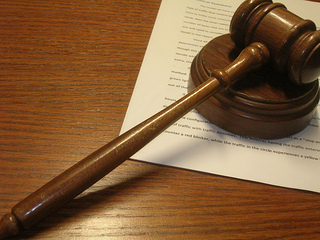– Dan Freund, Eau Claire bankruptcy attorney
More bankruptcy questions? Check our our FAQ page.
 This page contains general information. Contact a WBG attorney for specific advice.
This page contains general information. Contact a WBG attorney for specific advice.
Your Wisconsin lawsuit is over. You or the other party has a judgment. they want to collect. Now what?
Well, not much – unless, that is, the creditor takes action. Some of the most common creditor options include:
Docket The Judgment. The winning party – the “judgment creditor” – can pay a small fee to “docket” the judgment in the county. Once docketed, the judgment acts as a lien on real estate in that county. The creditor can also obtain a “transcript” of the judgment and send it out for docketing in another county.
The docketed judgment will appear on the credit report of the losing party – the “judgment debtor.” The creditor can then wait for the debtor to sell real estate. Or the creditor can force the issue by starting a special type of foreclosure. However, a debtor may claim a homestead exemption of up to $75,000 equity (up to $150,000 for a couple).
Garnishment. The creditor can also start a garnishment action to require a party that owes the debtor money to pay the creditor instead of the debtor. Creditors frequently target wages. The law allows a creditor to seize up to 20% of a debtor’s paycheck, but not If that amount would put the debtor below the poverty line or if another creditor is already garnishing.
Creditors often seek to garnish bank accounts as well. But the law exempts the first $5,000 of non-business funds ($10,000 for a couple).
Levy & execution. The creditor can ask the judge to issue a “writ of execution” to have the sheriff take property away from the debtor. Again, the law exempts certain assets. For example, one person can shield up to $16,000 in household goods and motor vehicle equity.
Discovery. “Great,” a creditor might say, “but I don’t know whether my judgment debtor has any of these assets.” In small claims cases the law requires the debtor to provide a financial statement. If the debtor refuses you can ask the judge to make the debtor complete the form.
In other cases you can ask for a “supplemental examination” at which the debtor must appear and testify under oath. If non-exempt assets come to light the court commissioner can order the debtor to turn them over to pay down the judgment.
Debtor options. Unfortunately for creditors, debtors have post-judgment options as well.
More bankruptcy questions? Check our our FAQ page.
This page contains general information. Contact a WBG attorney for specific advice.
Wisconsin Bankruptcy Guide is provided by law firms designated as Debt Relief Agencies by the federal government because we help people file for relief under the Bankruptcy Code. We also provide other types of debt relief options.
Image credit: Brian Turner
